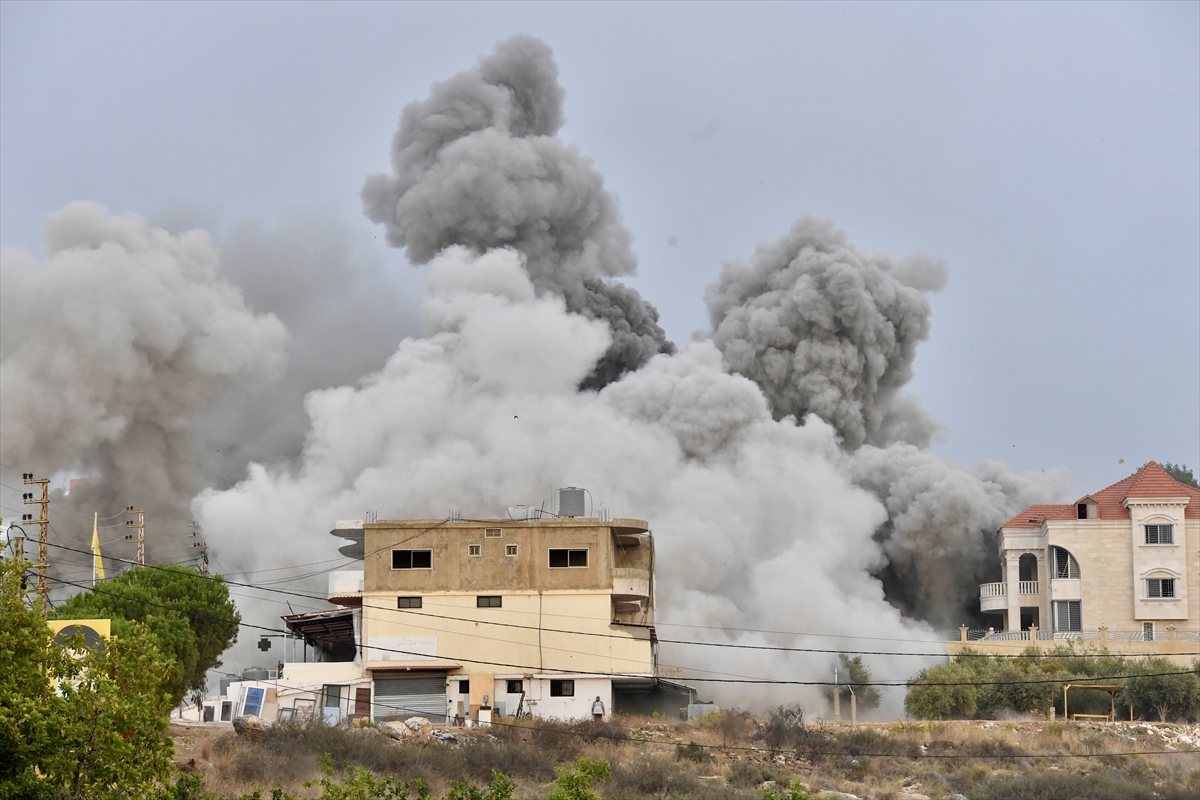
By Harun Nasrullah
London, (The Muslim News): Lebanese President Joseph Aoun on Thursday condemned Israeli airstrikes in southern Lebanon as a “full fledged crime”, as tensions along the border continue to escalate despite a ceasefire agreement in place since November 2024.
Israeli warplanes launched a series of strikes across several southern towns shortly after issuing evacuation orders. Buildings in Tayr Debba in the Tyre district, Al Taybeh in Marjayoun, Aita al Jabal in Bint Jbeil, and Zoutar al Sharqiya in Nabatieh were among the targets, the Lebanese news agency NNA reported. Additional strikes hit Kafr Dounin and Zawtar al Sharqiya in Nabatieh. Footage shared on social media and by Anadolu Agency showed powerful explosions, rising flames, and smoke engulfing the affected areas.
One person was reported injured in Tayr Debba, according to the Lebanese Health Ministry, while Israeli drones were observed flying at very low altitude over Beirut and its southern suburbs. Israel’s public broadcaster KAN cited military sources saying the attacks were coordinated with US forces – despite US being part of ceasefire monitoring mechanism – at Israel’s Northern Command base and aimed at preventing Hezbollah fighters from deploying near the border.
In a presidency statement, Aoun described the strikes as “a heinous political crime”, accusing Israel of deliberately undermining Lebanese sovereignty. “What Israel committed today in southern Lebanon constitutes a full fledged crime under international humanitarian law, which criminalises the targeting, terrorising, and forced displacement of civilians,” he said. He added that Israel’s actions show “its rejection of any negotiated settlement between the two countries” despite Lebanon’s repeated expressions of openness to peaceful negotiations.
The Lebanese army also condemned the attacks as “a continuation of the enemy’s destructive approach aimed at undermining Lebanon’s stability, expanding devastation in the south, and prolonging the war to maintain the threat against the Lebanese people.” It warned that the strikes hinder the army’s full deployment under the cessation of hostilities agreement and reaffirmed “close coordination with the UN Interim Force in Lebanon (UNIFIL)”, emphasising “the partnership between both sides remains at a high level of trust and cooperation.”
UNIFIL, which has operated in southern Lebanon since 1978 and was reinforced following the 2006 war under UN Security Council Resolution 1701, called on Israel to halt its airstrikes. “These airstrikes constitute clear violations of Security Council resolution 1701,” the mission said, noting that they “threaten the safety of civilians and undermine the progress being made towards a political and diplomatic solution.” UNIFIL stressed that its personnel remain on the ground with Lebanese soldiers, working to restore stability, and urged both sides to “adhere to their obligations under resolution 1701 and to the understanding reached in November, to avoid putting the current hard won progress at risk.”
The strikes follow heightened tensions in southern Lebanon in recent weeks, with Israel intensifying near daily air raids under the pretext of targeting Hezbollah members and infrastructure. Israeli Channel 12 reported that Tel Aviv is preparing for another potential round of fighting with the group.
Since the beginning of Israeli operations in October 2023, which escalated into a full scale offensive in September 2024, the Israeli army has killed over 4,000 people and injured nearly 17,000 in Lebanon. Israel committed 4500 violations of the ceasefire since last October 2024.
The ceasefire agreement signed between Israel and Lebanon on 26 November, which came into force on 27 November, provides for a ceasefire monitoring mechanism by the United States and France.
The attacks coincided with US Treasury sanctions on individuals accused of facilitating transfers of tens of millions of dollars from Iran to Hezbollah. They also occur amid Lebanon’s own plans to centralise control over all weapons, including those held by Hezbollah.
Speaking in Beirut on Tuesday, Aoun told visiting officials that Israel’s continued occupation of southern territory obstructs the government’s efforts to place all arms under state authority, a plan approved by the Lebanese Cabinet in August and slated for completion by the end of 2025. Hezbollah leader Naim Qassem has repeatedly rejected the initiative, insisting that Israeli forces must fully withdraw before disarming.
Thursday’s events underline the fragility of the ceasefire and the continued risk of escalation in southern Lebanon, where civilian safety remains under severe threat and political tensions show little sign of abating.
[Photo: Smoke billows from the area following Israeli attacks on the town of Tayr Dibba in the southern Lebanese province of Tyre, Lebanon, on November 6, 2025.Photojournalist:
Houssam Shbaro/AA]